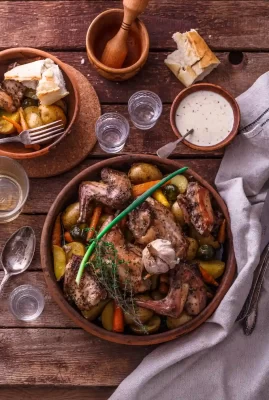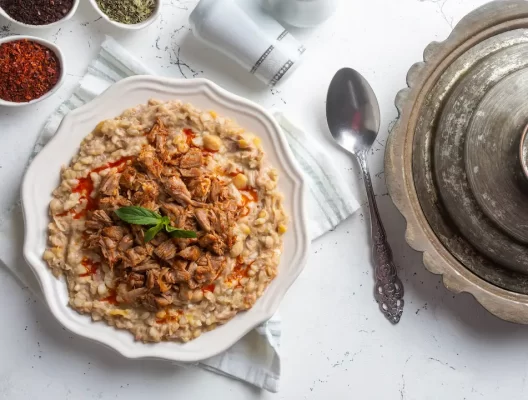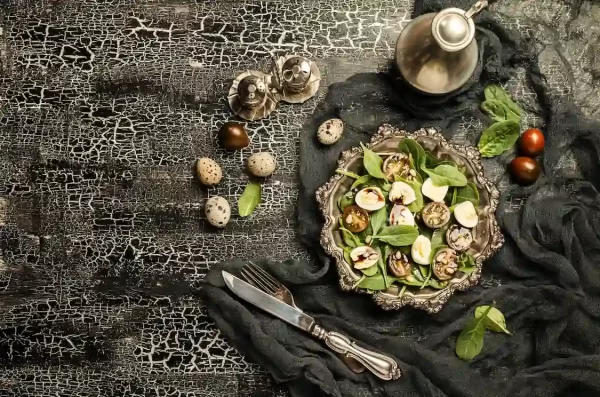Quail meat for the Mediterranean diet
The Mediterranean diet is known and appreciated worldwide for its many benefits, including promoting cardiovascular health and weight management. It is based on fresh, seasonal foods, mainly from Mediterranean areas, and favors a nutritional balance that emphasizes the use of plant-based foods, healthy fats, and lean proteins. In this context, quail meat emerges as an ideal option for those who want to incorporate a healthy and tasty protein source into their diet, without sacrificing the key principles that define, precisely, the Mediterranean diet.
Quail meat, with its mild flavor and nutritional properties, fits perfectly within this balanced eating pattern. With its low saturated fat content and significant intake of high-quality protein, quail meat is a food that meets the standards of the Mediterranean diet, promoting overall well-being without compromising taste.
Another advantage of including quail meat in the Mediterranean diet is its versatility. It can be used in a wide range of dishes, from the simplest to the most elaborate preparations, allowing those who follow this type of diet to experiment with new flavors while remaining true to the principles of the Mediterranean diet.
What is the Mediterranean diet and why it is considered healthy
The Mediterranean diet is a traditional eating pattern of the regions bordering the Mediterranean Sea, known for its health benefits. It is characterized by a high concentration of fresh foods, moderate consumption of meat and animal products, and a predominance of plant-based ingredients. Pillars of this diet include abundant use of fruits, vegetables, legumes, whole grains, fish and olive oil, which provide essential nutrients such as fiber, vitamins, minerals and omega-3 fatty acids.
One of the key aspects of the Mediterranean diet is the inclusion of lean protein, with limited consumption of red meat and increased intake of fish, chicken and, to a lesser extent, game meat. Red meat consumption is reduced to minimize intake of saturated fat, which is associated with increased risk of cardiovascular disease. In this context, quail meat is proposed as an excellent alternative: not only is it a lean meat, but it also has a nutritional profile that makes it ideal for a healthy diet.
Although quail meat is an animal product, it has a much lower fat content than red meats such as beef and pork. This makes it an excellent choice for those who wish to reduce their saturated fat intake while still enjoying the taste of meat. In addition, quail meat is rich in high-quality protein, which is essential for the maintenance of muscle mass and proper functioning of the body. This food therefore fits perfectly into the Mediterranean diet, which emphasizes lean, high biological value proteins from animal and plant sources.
Quail meat is also a good source of essential minerals such as iron and phosphorus, which support immune system health, energy production and bone maintenance. These nutritional benefits are especially valued in the Mediterranean diet, which aims to promote good overall health through the intake of nutrient-rich foods.
How quail meat fits into the Mediterranean diet
 Quail meat is a versatile ingredient that lends itself perfectly to preparations typical of the Mediterranean diet. In a diet that favors variety and balance, quail meat can be cooked in a variety of ways, ranging from simple grilling to more elaborate preparations such as stews or baked dishes. Its characteristics make quail meat ideal for dishes that combine fresh and seasonal ingredients, such as vegetables, legumes, and whole grains, which are essential in Mediterranean cuisine.
Quail meat is a versatile ingredient that lends itself perfectly to preparations typical of the Mediterranean diet. In a diet that favors variety and balance, quail meat can be cooked in a variety of ways, ranging from simple grilling to more elaborate preparations such as stews or baked dishes. Its characteristics make quail meat ideal for dishes that combine fresh and seasonal ingredients, such as vegetables, legumes, and whole grains, which are essential in Mediterranean cuisine.
A classic example of a pairing in the Mediterranean diet might be grilled quail with sides of seasonal vegetables, such as zucchini, eggplant, peppers, or tomatoes, dressed with olive oil and fresh herbs such as rosemary and thyme. This type of dish not only respects the principles of the Mediterranean diet, but also enhances the delicate flavor of quail meat, which goes perfectly with the freshness of the vegetables.
Quail meat can also be incorporated into richer dishes, such as soups and stews, where its light flavor blends with that of other lean proteins, such as chicken or fish, creating nutritionally complete dishes. For example, a typical dish might be quail soup with lentils and fresh tomatoes, thus combining the protein of meat with the complex carbohydrates and fiber of legumes. This combination is perfect for those seeking a healthy, balanced meal that respects the tradition of the Mediterranean diet.
As for the consumption of quail meat in main meals, it can be easily alternated with other lean meats, such as chicken or turkey, without sacrificing taste and variety. Quail meat is, in fact, a versatile protein that can be eaten in many different ways, fitting perfectly with the flexibility of the Mediterranean diet.
Another way quail meat can be incorporated into the Mediterranean diet is through the use of quail eggs, another product derived from the same species. Quail eggs are rich in protein and can be used in light dishes such as salads or vegetable dishes, further enriching the nutritional profile of the meal.
Benefits of quail meat in the Mediterranean diet
Quail meat stands out as a high-quality protein, perfectly in line with the principles of the Mediterranean diet, which favors a nutrient-rich and balanced diet. One of the main characteristics of quail meat is its high biological value protein content, which is essential for maintaining and building muscle mass, as well as aiding recovery after physical activity. Protein is also crucial for optimal immune system function, hormone production, and healthy skin.
Quail meat contains a good amount of essential amino acids, those that our bodies cannot produce on their own and must take in through food. The quality of protein provided by quail meat makes it an attractive alternative to other protein sources, such as red meat, fish, and legumes, which are also a fundamental part of the Mediterranean diet.
Another aspect that makes quail meat particularly suitable for this dietary style is its reduced content of saturated fat, a crucial parameter for those following the Mediterranean diet. Compared to other red meats such as beef and pork, quail meat is significantly less fatty, making it a good choice for maintaining a balanced nutritional profile without compromising cardiovascular health. Reducing saturated fat helps keep cholesterol levels in the normal range, reducing the risk of cardiovascular disease, one of the main goals of the Mediterranean diet.
In addition to its fat- and protein-related benefits, quail meat also fits perfectly into a Mediterranean diet because of its content of micronutrients such as iron, zinc, and B vitamins, which support the nervous system and contribute to red blood cell production. These nutrients are essential for overall well-being and improve metabolism, making quail meat a complete source of nutrients that can supplement the diet in a healthy way.
Another significant advantage of quail meat is its low calorie density, making it ideal for those who want to maintain a healthy weight without sacrificing taste or nutrients. In a dietary regimen that seeks to balance protein sources with moderate calorie consumption, quail meat can be an excellent alternative to red meat, which is often higher in calories and higher in saturated fat.
Finally, incorporating quail meat into the Mediterranean diet allows for a variety of protein sources while maintaining a rich and balanced nutritional profile. A monotonous diet with little protein variety can lead to nutritional deficiencies. Quail meat, along with other foods typical of the Mediterranean diet such as legumes, fish, and poultry, offers a wide range of protein and micronutrients that can better meet daily nutritional needs. In addition, this meat allows for tasty and original dishes without compromising the principle of moderation that characterizes the Mediterranean diet.
Integration of quail meat into Mediterranean-flavored diets
Quail meat is versatile and can be easily incorporated into a variety of dishes typical of the Mediterranean diet. Despite its relatively recent presence in Mediterranean cuisines compared to other more traditional meats, quail has earned a place of honor because of its delicacy and unique flavor that makes it suitable for various types of culinary preparations.

A perfect example of how quail meat can be integrated into the Mediterranean diet is the risotto with quail and vegetables. This dish, which combines the rich flavor of quail meat with the freshness of seasonal vegetables such as zucchini, eggplant and tomatoes, fits perfectly into the Mediterranean diet. Risotto is a great way to combine whole grains with the light protein of quail meat, helping to balance the dish with fiber, vitamins and minerals.
Another traditional dish that can easily include quail meat is roasted quail with Mediterranean herbs. Aromatic herbs such as rosemary, thyme, marjoram, and oregano are used abundantly in Mediterranean cooking to enhance the flavor of meat, which in this case turns out to be soft and flavorful, while still keeping calories low. Roasting allows the quail meat to release all its juices, becoming tender and succulent while maintaining a low amount of fat.
Quail alla cacciatora, another history-rich dish in Mediterranean cuisine, is a recipe that combines quail meat with tomatoes, black olives, capers and red wine. This dish is perfect for a convivial lunch, but it also fits perfectly into a healthy, balanced eating plan. Olives, extra virgin olive oil and tomatoes provide the healthy fats and micronutrients needed to make the dish complete and full of flavors typical of the Mediterranean diet.
In addition to main dishes, quail meat can also be used in Mediterranean salads, where it is combined with fresh ingredients, for example, lettuce, cucumbers, cherry tomatoes, red onions, olives, and a sprinkling of feta. In this case, quail meat, cooked in pieces or grilled, becomes an excellent source of lean protein, perfect for a light but nutritious meal.
Finally, quail meatballs, a lighter version of traditional meatballs, are another interesting way to incorporate quail meat into Mediterranean recipes. Combined with crumbled whole-wheat bread, a little garlic, fresh parsley, and Parmesan cheese, these meatballs offer a new variation for a dish that can be served either as an appetizer or a main course. Combining quail meat with legumes or fresh vegetables provides a nutritionally complete dish that enriches the menu with a lean and tasty protein.
In general, quail meat is a versatile protein source that can be easily incorporated into many preparations of Mediterranean cuisine. Its mildness and nutritional benefits make it a perfect choice for those seeking to follow a balanced diet that is rich in protein, low in saturated fat and suitable for a wide range of light, healthy and tasty dishes. Quail meat enriches the Mediterranean diet without compromising the principles of moderation, variety and freshness that characterize it.
Benefits of quail eggs in the Mediterranean diet
Quail eggs are an excellent alternative to traditional chicken eggs, especially for those looking for a nutrient-rich option. In the Mediterranean diet, where variety and balance are key principles, quail eggs can be included in many preparations to add a sophisticated but healthy touch. Not only are these eggs nutritious, but they also offer a nutritional profile that makes them particularly suitable for balanced and varied diets.
 Quail eggs as an alternative to traditional eggs
Quail eggs as an alternative to traditional eggs
Quail eggs are small, but very nutritious. They are rich in protein and have a healthy fat content, with a proportion of unsaturated fatty acids that makes them an ideal choice for those seeking to maintain optimal nutritional balance. This makes them perfect for lighter dishes typical of the Mediterranean diet, such as salads, omelets or even as delicate appetizers.
Quail eggs are also a good choice for those who want an option with a more balanced nutritional profile than chicken eggs, due to their low concentration of saturated fat and the fact that they contain vitamins and minerals in higher concentrations, such as vitamin B12, vitamin A and iron. This makes them particularly versatile for enriching any dish without compromising the principles of the Mediterranean diet, which focuses on fresh, nutritious foods.
How to supplement quail eggs
Quail eggs are a very versatile ingredient and fit easily into typical Mediterranean cuisine preparations. They can be used to enrich salads, perhaps accompanied by fresh seasonal vegetables, as mentioned, legumes and an olive oil-based vinaigrette, which is the key ingredient in the Mediterranean diet. Due to their delicate texture and flavor, quail eggs are perfect for eating in salads with tomatoes, arugula, olives, and feta, typical of Greek tradition.
In addition, quail eggs are ideal for making light omelets, as they can be cooked quickly without altering their nutrients and keeping the dish light but nutritious. This type of dish fits perfectly into the Mediterranean diet, which involves quick cooking and the use of fresh ingredients, without excessive seasonings or techniques that can reduce the nutritional value of the food.
Even as appetizers, quail eggs are popular in Mediterranean recipes, perhaps served hard-boiled and topped with olive oil, black pepper, and a sprinkling of herbs such as rosemary or thyme, which are often used in Mediterranean cooking. Another very typical preparation is poached quail eggs, served on a base of mashed vegetables, such as pea or potato puree, for an elegant yet healthy proposition.
Nutritional profile of quail eggs and their benefits in a balanced diet
Quail eggs are a concentrated source of high-quality protein, useful for building muscle and maintaining muscle mass. They contain about 1.2 grams of protein per 9-gram egg, which is about 12-13% of the egg’s weight. This makes them an excellent source of complete proteins, which contain all the essential amino acids needed by the human body.
Lipid-wise, quail eggs contain about 1 gram of fat per egg, most of which is unsaturated fat. Unsaturated fats, known for their beneficial effects on the heart, are a key feature of the Mediterranean diet, which emphasizes the use of healthy fats, such as those found in olive oil and fish, to promote cardiovascular health.
In addition to protein and fat, quail eggs are also rich in vitamins and minerals. They contain B vitamins, including B12, which is essential for proper functioning of the nervous system, and vitamin A, which is important for vision and the immune system. In addition, they are a good source of minerals such as iron, which is necessary for red blood cell production and oxygen transport in the body, and phosphorus, which is essential for bone health.
The combination of these nutrients makes quail eggs an ideal food for those following a Mediterranean diet that aims for a balanced intake of protein, fat, vitamins, and minerals from fresh, high-quality foods.
Quail meat and low-fat diets
Quail meat is particularly suitable for those on low-fat diets or those who wish to maintain a light diet without sacrificing taste and nutrition. In fact, for those seeking lean protein, quail meat offers an ideal solution. Compared with other meats, such as beef or pork, quail meat contains less saturated fat and more unsaturated fat, which are considered beneficial for cardiovascular health.
Quail meat as ideal for those seeking lean protein
In the Mediterranean diet, quail meat fits perfectly for those who wish to maintain a balanced, low-calorie diet. Quail meat is a high-quality source of protein that does not contribute excessive saturated fat. In addition, quail meat is easily digestible, making it an excellent choice even for those on a low-calorie diet without sacrificing taste.
Lean meats, such as quail meat, are particularly recommended in low-calorie diets, where efforts are made to reduce fat consumption while maintaining a good protein intake. In a Mediterranean diet, which is naturally rich in healthy fats from sources such as olive oil and oilseeds, quail meat offers a lean protein that pairs perfectly with dishes rich in vegetables, legumes, and whole grains, without weighing down the meal.
Incorporating quail meat and quail eggs into the Mediterranean diet is not only a way to enrich one’s diet, but also an opportunity to benefit from high-quality protein that is low in saturated fat and rich in essential nutrients. These foods fit perfectly into a balanced diet plan, ideal for those who want to improve their diet with lighter choices without sacrificing taste and variety.
Quail meat, with its nutritional profile making it an excellent source of lean protein, is perfect for those seeking alternatives to red meat and wanting to maintain a healthy, balanced diet. Quail eggs, small but rich in vitamins and minerals, complement the Mediterranean diet, adding a touch of sophistication and versatility to dishes such as salads, omelets, and appetizers.
Integrating these foods into typical dishes of the Mediterranean diet, such as risottos, roasts, and salads, provides the perfect mix of flavor, nutrition, and lightness. The Mediterranean diet is not just a dietary pattern, but a philosophy that promotes well-being and long-term health, and quail meat and quail eggs are ideal ingredients of it, capable of enriching and diversifying every meal in a healthy and tasty way.